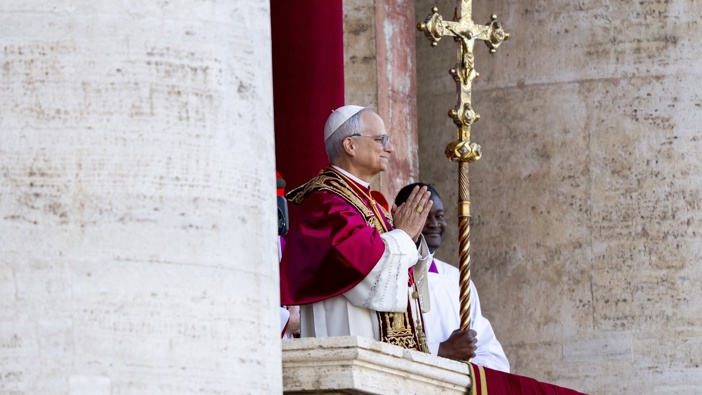Follow
the podcast on


I don’t often quote Albert Einstein, but I’m going to today.
“Those who believe that politics and religion do not mix, understand neither.”
And if the new pope didn’t understand that before today, he will now. Because Cardinal Robert Prevost —who will be known as Leo XIV— has only just been elected and already he’s being lobbied by politicians around the world.
He’s the first pope to come from the United States, and the pressure on him to start making noises on global issues has been pretty much immediate.
As I was following the live coverage this morning, Volodymyr Zelensky was already on social media saying that he hopes the new pope will condemn Russia’s invasion of his country. Saying that he wants the Pope to push for international law to be upheld, to condemn Russia’s military aggression and to do whatever he can to protect the rights of innocent civilians.
Colombia's president was at it too. Saying that he hopes the new pope will back Latino migrants living in the United States who he says have been “humiliated” by the current administration.
Which raises two questions: 1. How much political sway does the Pope actually carry? And 2. Is it the job of a religious leader to try and influence global politics?
I’m not convinced that the Pope does actually carry much sway. He does in terms of leading the Catholic Church, but that doesn’t mean that the Pope and other religious leaders can or should hide away and just focus on running the shop.
Because if they do that, they become irrelevant.
Take the British royal family. They’ve been criticised over the years for being out of touch —for being too removed from the real world— and look at what’s happened to their power and influence.
The same goes for the Catholic Church. The same goes for all religions.
If they ignore what’s going on in the real world —and if they don’t have a view on what’s happening in the real world— then they will become irrelevant in people’s eyes.
I was reading some comments by Margaret Susan Thompson, who is a professor of history and political science in the United States, and she was saying that the Pope doesn’t necessarily change the world, but he can influence the way Catholics think about global issues.
She says: "Ultimately, the Pope has very limited political power in terms of shifting peoples' opinions on an issue. But his moral guidance is still helpful to many Catholics.”
Not that the new pope’s predecessor, Pope Francis, shied away from saying a thing or two.
I don’t think his comments carried any particular weight —in terms of influencing outcomes— but he did exactly what I think the new pope needs to do. What all religious leaders need to do. Even if their actual influence is limited, they need to show their relevance in the modern world.
Pope Francis did condemn the war in Ukraine. He said Russia had carried out an unjustified act of aggression. He called Ukraine a "martyred nation" and appealed for peace pretty much every time he appeared in public.
But he didn't stop the war. He also didn’t stop what’s going on in Gaza, even though he did video calls to a Catholic church in Gaza every day.
But that doesn't mean he shouldn’t have done it, and it doesn’t mean that the new pope shouldn’t do it, either.
Because, especially in times like these, it is critical that the Pope and all religious leaders of all types show that they are part of the real world that we all live in.
Take your Radio, Podcasts and Music with you









